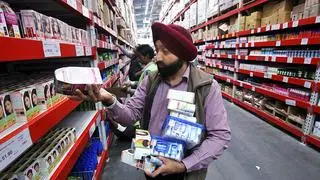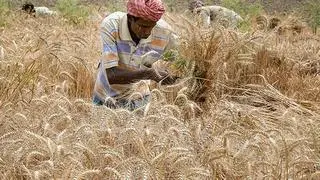Ahead of Nepalese Prime Minister KP Sharma Oli’s visit to India next month, New Delhi has sought “concrete results” by way of greater representation for the protesting Madhesi people in Nepal’s new constitution.
According to highly placed sources, talks are under way between the two neighbours to try and achieve a common ground that seeks to accomplish four basic objectives — including the ethnic Madhesis (people residing in the Terai region bordering India) and Janjatis (indigenous communities) in Nepal’s mainstream politics, granting adequate political representation to people living in the Terai region, granting them citizenship and establishing a federal structure.
“All these amendments have to be made to the new constitution. Otherwise, the divide between the ‘Pahari’ elite and the Terai people will widen and give rise to more problems, which has huge implications for India,” a top official said.
The official said discontent was growing on the issue of citizenship among the agitating Madhesis. In Nepal, there are two kinds of citizenship — by descent and by naturalisation. The latter is considered superior, which is one of the reasons for the ethnic groups’ protests against the ruling elite.
According to the official, the bone of contention between India and Nepal with regard to the newly promulgated constitution is the “rollback of what was agreed upon with the Madhesi parties in terms of their greater representation in the interim constitution.”
“We are neither pro-Madhesi nor anti-Pahari. We only want a stable Terai and a stable Nepal,” the official said.
The official, however, maintained that it would be in Nepal’s advantage to “change their mindset against India”, which is increasingly proving to be “more counterproductive” for them.
Last month, Nepal’s Deputy Prime Minister and Foreign Minister Kamal Thapa had visited India with a proposal to amend the constitution to make it more inclusive and to delineate electoral constituencies on the basis of the population, said a statement from the Ministry of External Affairs.
Also, Prime Minister Narendra Modi had a telephonic conversation with Oli on December 31 on the political developments in Nepal and invited him to visit India.
So far, over 50 people have lost their lives in the protest by the Madhesis since August. The agitation has also led to blockades at all the border points between India and Nepal.
At present, the main Raxaul-Birgunj border checkpoint continues to remain blocked, but over 1,500 trucks from India carrying essential commodities are entering Nepal every day through other checkpoints.







Comments
Comments have to be in English, and in full sentences. They cannot be abusive or personal. Please abide by our community guidelines for posting your comments.
We have migrated to a new commenting platform. If you are already a registered user of TheHindu Businessline and logged in, you may continue to engage with our articles. If you do not have an account please register and login to post comments. Users can access their older comments by logging into their accounts on Vuukle.